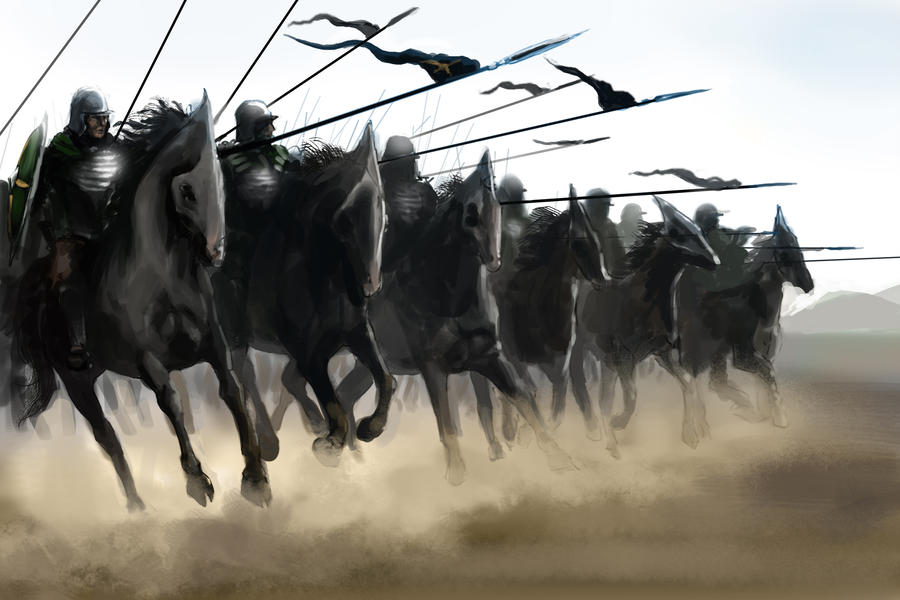The last charge of Quintilian Varo
In 1933 A.U.C. after a long period of peace the Persian Empire declared war on the Roman Empire. The reason for the conflict was the possession of Syrian territory, and specifically the Persian desire for direct access to the Mare Nostrum.
However the legion stationed in the province at that time, the IV Augusta had only 2/3 of the personnel, as part of the troops had been commissioned to suppress some revolts in Egypt, while at the same time the Persian forces amounted, according to different sources, between 40,000 and 50,000 units.
Once the news of the invasion arrived it was already late, since the Persian troops had managed to prevent the arrival of messengers for some time thanks to their light cavalry and to fast and precise actions, managing not to be noticed by the border forts if not when it was too late; however, governor Quintilian Varo was not discouraged, and quickly gathered his forces.
His aim was not to repel the invasion, but to buy time to allow the other legions to arrive, so he adopted a temporizing tactic, recruiting several legion veterans in the meantime to replenish his ranks without having to resort to conscription, as he believed that to use such a difficult tactic, and above all a tactic that required such strength of mind, people without training would have been more of an obstacle than a help.
Despite this tactic allowing to slow down the enemy, the Persians were pressing, relying on constant supplies from their homeland and higher numbers, which nevertheless allowed them to put Varo's army in difficulty and keep it under constant pressure.
The Persian commander Crosoe Marsa, fed up with the constant delays caused by Varo's tactics, decided to aim directly at Aleppo, in order to establish a base on the Mare Nostrum and, having obtained a bridgehead, use it as a base for subsequent attacks.
Having received news that the bulk of the Persian forces were heading towards the city while their forces were tied up with other troops that served as a shield against the Roman army caused great anguish to Varo, since he realized that he would not be able to move the army in time to intercept the Persian army, and the garrison left in the city, composed mainly of recruits and the wounded, could do very little against the bulk of the enemy army.
After a consultation with his officers Quintilian Varo made a decision: he would entrust the command of the bulk of the army to his younger brother, Iulianus Varo, while he with an escort of 100 of his best knights would point towards Aleppo trying to reach the city to organize a defense and at the same time an escape for civilians.
At this point the historical reports, both Roman and Persian, become contradictory.
However it is known that for some reason the governor decided to change his plans, heading towards the enemy camp.
Based on the later reports we know that during the night, when the Persians were now in sight of the city walls Varo and his men attacked the enemy camp, exploiting the horses and the surprise to generate the greatest possible panic.
Varo managed to break through the enemy camp, arriving at the tent where Marsa rested, managing to kill him; here the Roman and Persian sources disagree, in fact for the Romans it was a great duel, while for the Persians the killing was rapid, and Marsa was trampled under the hoofs of the horse while it was still without protections.
In any case, despite the killing of the enemy general the fate of the 100 was marked, and their stripped bodies were hung from trees around there, while Varo was beheaded, and his head thrown into Aleppo through a catapult.
However the night assault obtained a result, in fact the Persian troops withdrew from the siege of Aleppo, taking a more defensible position.
This decision was probably due not so much, or not only, to the loss of the general, as to the fact that the Romans, with their assault, managed to ignite part of the supplies and obsidional machines; in addition to injuring and killing a good number of Persians causing a considerable shock among the enemy ranks.
However, the withdrawal of the Persian troops and their consequent expectation of reinforcements and supplies left the Roman reinforcements arrive and reorganize themselves, pushing this army back across the border.
Summary
An heroic, suicidal strike to save a city from enemy hands.
Spread
It's a quite known historical fact among historians and students, but the majority of the population doesn't know it.
Cultural Reception
While the historical facts are known to both Roman and Persian scholars this nighttime charge is relegated in a foot note in many persian treatesies, while in the Roman Empire it has become one of many examples of roman valor.
It has been immortalized in a lot of books, art pieces and more, and a song from the metal group "Ferrea Virgo" from the province of Britannia.
Remove these ads. Join the Worldbuilders Guild









Comments